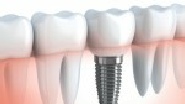

Patient Information: Dental Implants
“ There are many uses for dental implants they can be used to support loose dentures, replace lost teeth, support bridges. Although not an absolute replacement for a tooth or teeth they are a very close replacement to the natural tooth. I’ve gained experience from some of the north west’s pioneers in high street dental implantology. Implants have been around for around 80 years which in medical terms is a relatively new science. The technology and procedures involved are constantly evolving and progressing with success rates approaching 90% over a ten year period. This area of dentistry requires regular training and updating which is what makes this area of dentistry rewarding and engaging. “

Bare Dental Clinic
patient information


Implant leaflet


Implants for dentures leaflet
Implants for missing teeth leaflet
l
Pre-

Post operative instructions

What is a dental implant?
Dental implants are Titanium or Zirconium screws surgically placed into the jaw. They are used to replace a missing tooth or teeth. After a short period to allow the bone to heal to the implant the screw has connection from between the screw to the mouth. The connection then has a crown, bridge and or denture clip attached to it.

What does the treatment involve?
The techniques and designs using implants are constantly advancing, reducing the number of appointments and procedures until your procedure is complete. The period until the implant can be used to chew differs from case to case. For routine single tooth implants it would take three months. Where less bone is available the process may take a year. It is important to make sure you understand your plan.
After an initial assessment and consultation further scans or x-
After a period of healing the next stage is to connected the implant through the gum. This requires a small surgical procedure completed with local anaesthetic and sutures. After a period of 4-
Above is the a basic description of the stages involved. In most cases you should allow six months and expect many appointments for the procedure to be completed. Where sutures are used a review appointment is required 10 days to two weeks following the procedure. Sometimes stages can be combined which reduces the number of appointments. Implants are the closest we have to a replacement for teeth. It is a complex procedure but the result is worth the wait.


Why choose an implant?
The benefits of implant treatment are reliability, comfort and conservation of the adjacent teeth, bone support and prevention of further bone loss as well as confidence. Implants can be an alternatives to dentures and bridges or used to hold/support loose dentures. Please see the website for further information about these treatment options.
Who can have a dental implant?
The majority of patients are suitable for implant treatment. With the exception of patients with rare medical conditions, patient who have had facial radiotherapy, who are taking bisphosphonates, have severe diabetes, untreated dental decay, periodontal disease, are long term heavy smokers, patients who grind there teeth.
How long do implants last?
Nine out ten implants can be expected to last for over ten years. This is provided you maintain regular dental examinations, hygiene and maintenance appointments.
Temporary teeth.
During treatment you will be able to wear a temporary plastic denture or removable type bridge.
What to expect after treatment/Aftercare?
When treatment is completed you can expect to use implant supported teeth in a very similar way to natural teeth. It is important to understand that implant supported teeth require ongoing daily cleaning and maintenance just like normal teeth as they can suffer gum disease. If you have a history of gum disease this will require maintenance. Regular inspections by the dentist is part of the ongoing maintenance programme for implants.
What if I do not have enough bone to support a dental implant?
It is important to try to maintain bone where possible with careful extraction of teeth and timely placement of implants. After a tooth is removed the socket where the tooth’s root sat fills with bone. Without the stimulus of pressure from the tooth the bone begins to shrink and the bone’s height and width reduces. Removing teeth gently and using bone grafting will maintain your bone and improve the final result.
Grafting can be used to create bone where teeth have been missing for many years and the bone has shrunk. In cases where the bone loss could not be avoided, a bone graft can be used to fill in bony gaps around the implant. In severe cases a small amount of bone is taken from another part of the jaw this bone is screwed to the jaw bone where the implant is planned to be placed. The graft is then given 6 months in order to mature. Grafts can at times be placed into a patient’s sinus ( sinus lift) to create sufficient bone at the back of your top jaw.
The Cost of dental implants and associated procedures
The cost of single implants compares favourably with conventional bridges. Your treatment plan and estimate will explain the time line and expected fees. In the very unlikely event of unexpected extra costs it will either be discussed with yourself and added to your plan or absorbed by us. An initial consultation can help to outline your options and a rough estimate of the costs and time frame involved. See the clinic’s pay as you go web page for a guide to the costs: IMPLANT PRICE GUIDE
Do having implants hurt?
Implants can be placed in the jaw using an injection in the gum. Sometimes sedation is used if you are nervous about the procedure. If the procedure is very invasive, complex or the patient is very nervous a general anaesthetic can be used. You will not feel pain at any time during the procedure. You should expect some discomfort for approximately ten days after the procedure. This can be managed with pain killers. It may be difficult to wear a denture of the surgical area for a period of time following the procedure. Approximately a week after the procedure the sutures are removed and the healing improves day by day.
What are the risks ?
Every medical procedure has risks. Implants are surgically placed into the bone. The bone will have blood vessels and nerves. The implant will emerge from the gum. All of these structures can be damaged during the procedure. The gum around adjacent teeth can recede and damaged blood vessels can cause serious bleeding which if uncontrolled can be fatal. Damage to nerves can cause permanent or temporary altered of sensation in an area of your mouth or lips. Sometimes nerve damage can cause permanent pain, tingling sensations in your lips. If each area of the mouth has different risks ad your dentist will explain the risks after your assessment and consultation.
Implants have over a 90% success rate but they can loose integration with the bone. They can suffer gum disease similar to periodontal disease called mucositosis and implantitis. Some factors can increase this risk. Smoking, diabetes grinding your teeth and a unhealthy life style can influence the success of the implant treatmemnt.
What are the alternatives?
- Do nothing
It is important you understand your treatment options and final treatment plan. If you have any questions, please contact the clinic.
Are implant teeth difficult to clean?
No, but special attention is required if you are going to have a long-
If I have had gum disease when I had my own teeth will I get it with the teeth attached to implants?
Yes, if you don’t care for them well enough. If you keep them clean, don’t smoke then should not have any problems.
Can I take the teeth out if they are fixed implants?
Teeth screwed or glued to the implant can only be removed by your dentist. If you have complete dentures fixed to the implants by bars or retainers then you’ll be able take them out so you can clean them properly.
What if I have an accident?
Implants can be damaged in the same way that natural teeth can. It is therefore important that you wear a professionally made mouthguard if you play sports that involve contact or moving objects. If there is damage, the teeth can be dismantled from the implant and replaced. If the implant screw is damaged it would need to be replaced or repaired. Sometimes the screw may be left in the jaw where and another implant placed alongside it to replace the damage implant.
What can implants used for?
Implants are similar to teeth and are used to replace one or several teeth. For multiple missing teeth implants can support a bridge. The bridge could potentially span from one side of the mouth to the other replacing all the teeth.
See the bridges web page for more information about how a bridge is used.
For patients with loose dentures, implants are a great solution to hold them in place. The dentures are connected to implants which reduces movement when eating.
Do having implants placed hurt?
Implants can be placed in the jaw using an injection in the gum. Sometimes sedation is used if you are nervous about the procedure. If the procedure is very invasive, complex or the patient is very nervous a general anaesthetic can be used. You will not feel pain at any time during the procedure. You should expect some discomfort for approximately ten days after the procedure. This can be managed with pain killers. It may be difficult to wear a denture of the surgical area for a period of time following the procedure. Approximately a week after the procedure the sutures are removed and the healing improves day by day.
The Cost of dental implants and associated procedures
Your treatment plan and estimate will explain the time line and expected fees. In the event of unexpected extra costs it will be discussed with you. An initial consultation can help to outline your options and a rough estimate of the costs and time frame involved. See the clinic’s pay as you go web page for a guide to the costs: IMPLANT PRICE GUIDE
What are the alternatives?
- Do nothing
It is important you understand your treatment options and final treatment plan. If you have any questions, please contact the clinic.
Are implant teeth difficult to clean?
No, but special attention is required if you are going to have a long-
If I have had gum disease when I had my own teeth will I get it with the teeth attached to implants?
Yes, if you don’t care for them well enough. If you keep them clean, don’t smoke then should not have any problems.
Can I take the teeth out if they are fixed implants?
Teeth screwed or glued to the implant can only be removed by your dentist. If you have complete dentures fixed to the implants by bars or retainers then you’ll be able take them out so you can clean them properly.
What if I have an accident?
Implants can be damaged in the same way that natural teeth can. It is therefore important that you wear a professionally made mouthguard if you play sports that involve contact or moving objects. If there is damage, the teeth can be dismantled from the implant and replaced. If the implant screw is damaged it would need to be replaced or repaired. Sometimes the screw may be left in the jaw where and another implant placed alongside it to replace the damage implant.